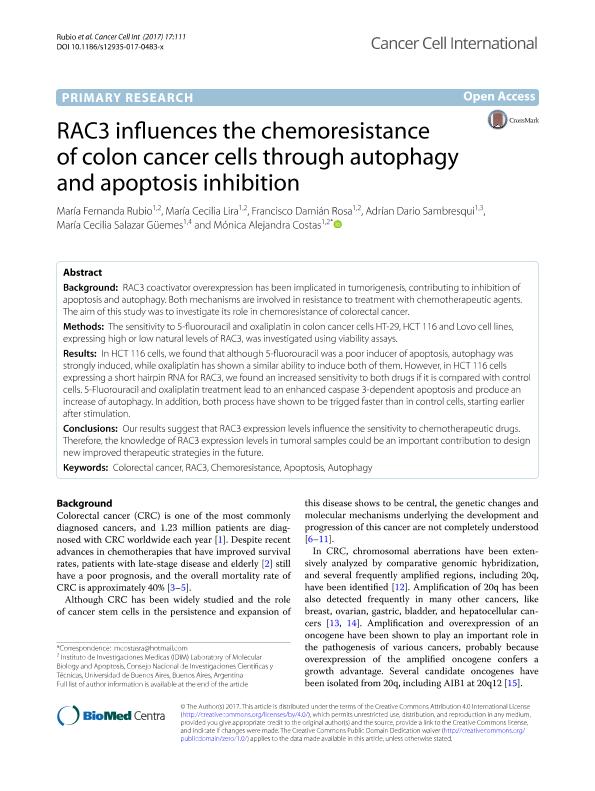Artículo
RAC3 influences the chemoresistance of colon cancer cells through autophagy and apoptosis inhibition
Rubio, Maria Fernanda ; Lira, María Cecilia; Rosa, Francisco Damián; Sambresqui, Adrián Dario; Salazar Güemes, María Cecilia; Costas, Monica Alejandra
; Lira, María Cecilia; Rosa, Francisco Damián; Sambresqui, Adrián Dario; Salazar Güemes, María Cecilia; Costas, Monica Alejandra
 ; Lira, María Cecilia; Rosa, Francisco Damián; Sambresqui, Adrián Dario; Salazar Güemes, María Cecilia; Costas, Monica Alejandra
; Lira, María Cecilia; Rosa, Francisco Damián; Sambresqui, Adrián Dario; Salazar Güemes, María Cecilia; Costas, Monica Alejandra
Fecha de publicación:
11/2017
Editorial:
BioMed Central
Revista:
Cancer Cell International
ISSN:
1475-2867
Idioma:
Inglés
Tipo de recurso:
Artículo publicado
Clasificación temática:
Resumen
Background: RAC3 coactivator overexpression has been implicated in tumorigenesis, contributing to inhibition ofapoptosis and autophagy. Both mechanisms are involved in resistance to treatment with chemotherapeutic agents.The aim of this study was to investigate its role in chemoresistance of colorectal cancer.Methods: The sensitivity to 5-fluorouracil and oxaliplatin in colon cancer cells HT-29, HCT 116 and Lovo cell lines,expressing high or low natural levels of RAC3, was investigated using viability assays.Results: In HCT 116 cells, we found that although 5-fluorouracil was a poor inducer of apoptosis, autophagy wasstrongly induced, while oxaliplatin has shown a similar ability to induce both of them. However, in HCT 116 cellsexpressing a short hairpin RNA for RAC3, we found an increased sensitivity to both drugs if it is compared with controlcells. 5-Fluorouracil and oxaliplatin treatment lead to an enhanced caspase 3-dependent apoptosis and produce anincrease of autophagy. In addition, both process have shown to be trigged faster than in control cells, starting earlierafter stimulation.Conclusions: Our results suggest that RAC3 expression levels influence the sensitivity to chemotherapeutic drugs.Therefore, the knowledge of RAC3 expression levels in tumoral samples could be an important contribution to designnew improved therapeutic strategies in the future.
Palabras clave:
Colorectal Cancer
,
Rac3
,
Chemoresistance
,
Apoptosis
,
Autophagy
Archivos asociados
Licencia
Identificadores
Colecciones
Articulos(IDIM)
Articulos de INST.DE INVEST.MEDICAS
Articulos de INST.DE INVEST.MEDICAS
Citación
Rubio, Maria Fernanda; Lira, María Cecilia; Rosa, Francisco Damián; Sambresqui, Adrián Dario; Salazar Güemes, María Cecilia; et al.; RAC3 influences the chemoresistance of colon cancer cells through autophagy and apoptosis inhibition; BioMed Central; Cancer Cell International; 17; 1; 11-2017; 1-17
Compartir
Altmétricas



